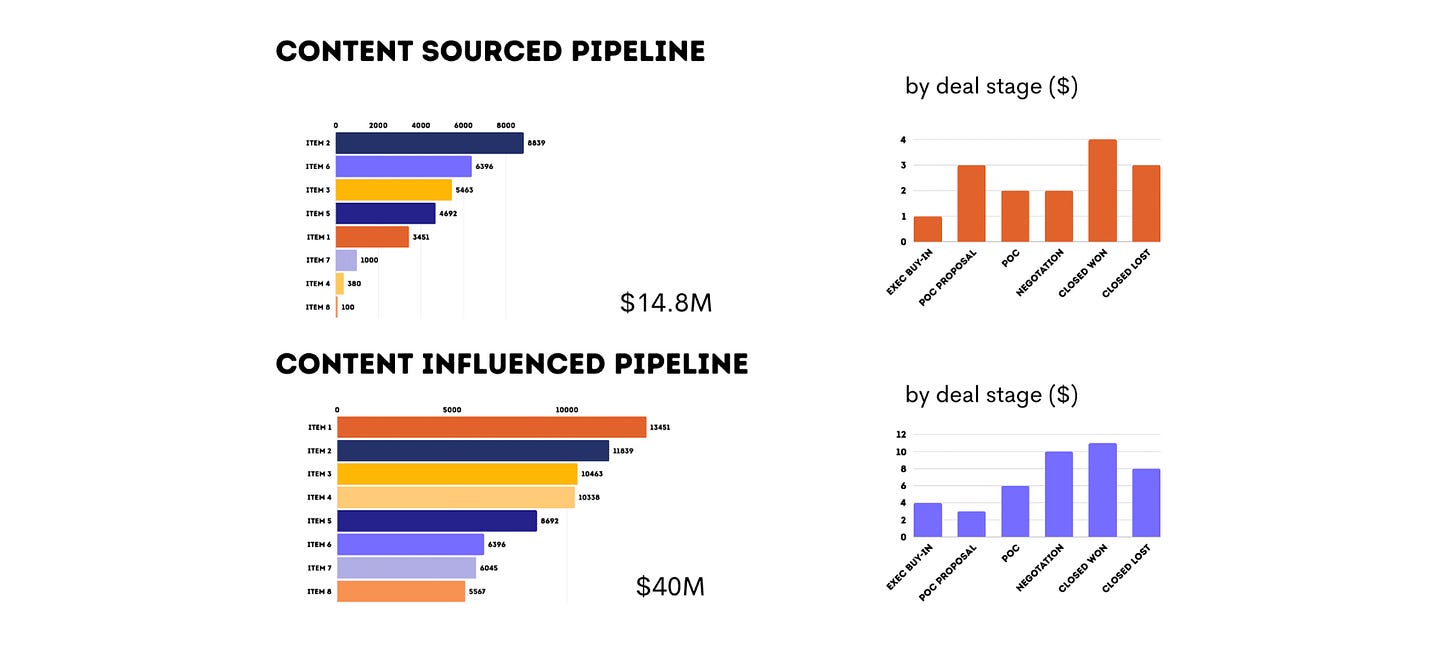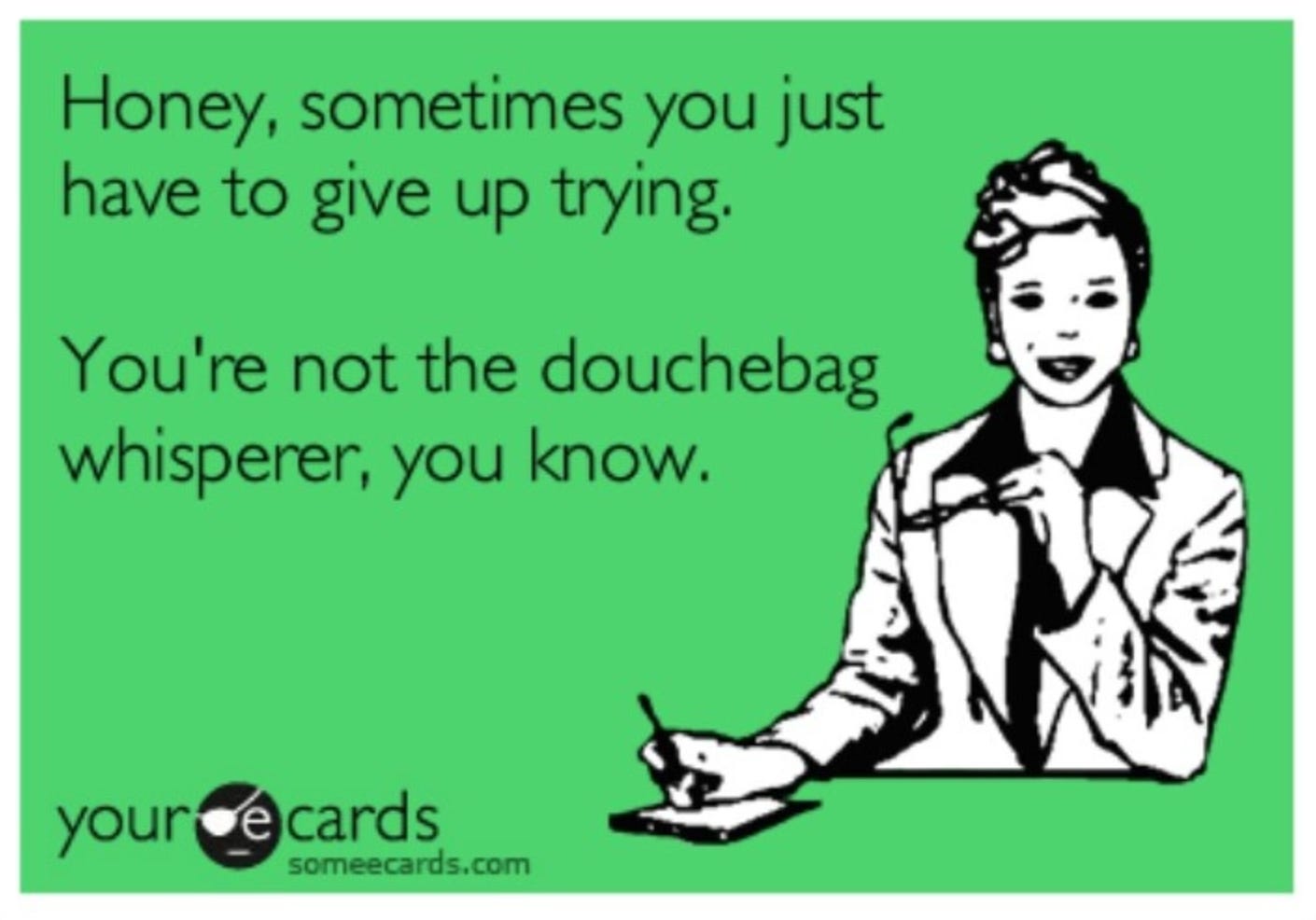A recent LinkedIn conversation I had (the magic happens in the DMs) really captured the zeitgeist of content marketing in 2024.
“We work incredibly hard, and the stress is constant,” a contact told me. “It's not that the bar is moving; it's that nobody at this company knows what constitutes good content. To them, it means a form-fill and a flurry of leads… We love what we do, but we're not always sure it loves us back.”
I don’t think I could ever explain that feeling better. I won’t even try.
But what I can speak to is how to keep the feeling of being undervalued from eating you alive, even in the job market from hell. What do we do when the company that signs content’s checks doesn’t love us back?
💪 Actionable Tip: Data Is Your Litmus Test
So let’s say that you’re in a situation where you feel undervalued as a content marketer. If you could show strong indicators of the value you bring to the table, how would your leaders respond? Is buy-in ever on the table, or are their minds made up?
This is why it’s important, especially in companies where marketing is on thin ice, to have some sort of data to show content’s potential impact on pipeline.
No, you can’t really claim that one piece of content was responsible for a company being open to a sales call — we know customer journeys are complex and involve lots of different touchpoints and multi-touch attribution is a trash fire that you should avoid at all costs — but you can point out the correlations, which is a start.
This data probably underreports content’s value, honestly.
If a prospect has heard of you and you’ve entered the consideration set, that is brand marketing (read: content) at work. Even if sales reaches out to them “first” and gets credit for that conversion. Even if they’re engaged and “were going to become a customer anyway.” 83% of the B2B buyer journey happens outside of sales conversations. How do you think they became highly engaged to begin with? 🤔
But here’s the thing:
IF you are able to provide data to support your story showing content’s bare minimum, short-term contribution to pipeline
and IF you explain why that data is just scratching the surface in terms of potential brand impact
and IF your leaders are still hemming and hawing about your numbers or getting after you about this gated asset not driving enough HOT LEADZZZ…
👉 that is a data point for you.
There are plenty of companies where marketing is the perfect scapegoat because it doesn’t behave exactly like a vending machine. When leaders aren’t willing to listen to reason supported by a clear data story, when they’re not willing to learn and change the narrative of marketing’s role (or content’s role within marketing), that’s maybe a sign that it’s not the right fit.
But start with the data story first.
Need to get your content reporting in order? Bending the Spoon gives content managers the tools and skills they need to prove content’s value with data.
🚫 Antipattern: Inferno
Thanks, Captain Obvious, you might say if you’ve gone through the steps above. But here I am in the worst job market in a decade. What am I supposed to do about it?
I remember slogging through Dante’s Divine Comedy in college, in the days years decades before I could just ask ChatGPT to summarize it. (Quick synopsis if you weren’t so lucky: Dante is led by ancient Roman poet Virgil through hell, purgatory, and heaven — in that order. Why Virgil? No idea, but he has a very “Rufus from Bill and Ted’s Excellent Adventure” vibe.)
So there’s hell and there’s purgatory, and they both suck. Like “having someone consistently gnaw on your skull” suck. But the difference Dante notices is that one place has suffering for eternity, and the other has suffering with a purpose and an expiration date.
Why do I tell you this? Because if you’re in this situation, you have a choice. You can suffer hopelessly, or you can suffer and get ready while you’re at it.
Your current situation isn’t hell, it’s just purgatory. This too shall pass.
So how do you prepare for the next step even when it’s not clear when it will appear? Some ideas:
Polish that resume. Don’t wait until it’s all over to write down your accomplishments. Get them while they’re fresh and the data is easy to access. While you’re at it, make sure you have downloads of all your work on your personal computer or in your own Google drive.
Think about your next pivot. A career coach I worked with once during a transition had me put everything I wanted in a job (and everything I didn’t) on a list, then rank them in order of importance. They became my true north when I was looking for my next role. Doesn’t hurt to start thinking now about ideas and warning signs you’ll be wise enough to avoid.
Start learning. If you are lucky enough to have a professional development stipend, spend every penny of it. What do you need to improve on to land a better job next time around? Would it help to work with a career coach or mentor? To take a course or join a community? Even if you have to shell out a bit of your own money, signing up for something to prepare you for what’s next feels like you’re taking a step in the right direction.
Find PD opportunities at work. This might sound counterintuitive if you’re disengaged. But let’s say the writing is on the wall anyway. What are some experiments you could run or peers you could shadow to broaden your skillset?
💡 Big Idea: What Your Job Is Not
So here’s a little story about how I quit my first job in marketing:
I was much more junior than I am now, junior enough to not see the red flags even though they were up in my face something like this:
Toxic behavior, verbal abuse, gaslighting, constantly changing goal posts, retaliation, public shaming, you name it.
And so little Lauren went into her boss when things were bad, and because I say what I think (it’s a problem), I told them that I was unhappy and I didn’t feel that my work was valued.
And do you know what they said?
"Oh, Lauren, don't be silly. OF COURSE your work is valued. If you left, I'd have to backfill your role."
It was like a lightning bolt. I quit on the spot.
Not to get all Dr. Phil here, but one of my content (and life) mantras is "we teach others how to treat us." Marketing gets respect by earning respect…
But only to a point. What I don’t want you to think is that if marketing is a trash fire at your company, it's all your fault. You didn't communicate or see the future well enough, and if you didn't make it rain money with no buy-in and no budget, that's on you.
So let me clear that up.
There's a limit to what you can accomplish on your own, and I've learned firsthand that you can't change the entire culture of a company or an executive team that believes that marketing is a lucky slot machine and won't hear otherwise.
Your job is to do your best:
👉 to create good quality work
👉 to collaborate to create said work
👉 to make said work easy to find and use
👉 to advocate for the value of said work
Your job is NOT:
🚫 to be the punching bag when none of the above efforts work for reasons that have nothing to do with you.
If you are doing what you feel is right in your gut, the problem likely isn't you — and the solution to that problem isn't either.
We teach others how to treat us. Sometimes in toxic marketing cultures, that education means saying goodbye. ✌️
Yours in contention,
Lauren










